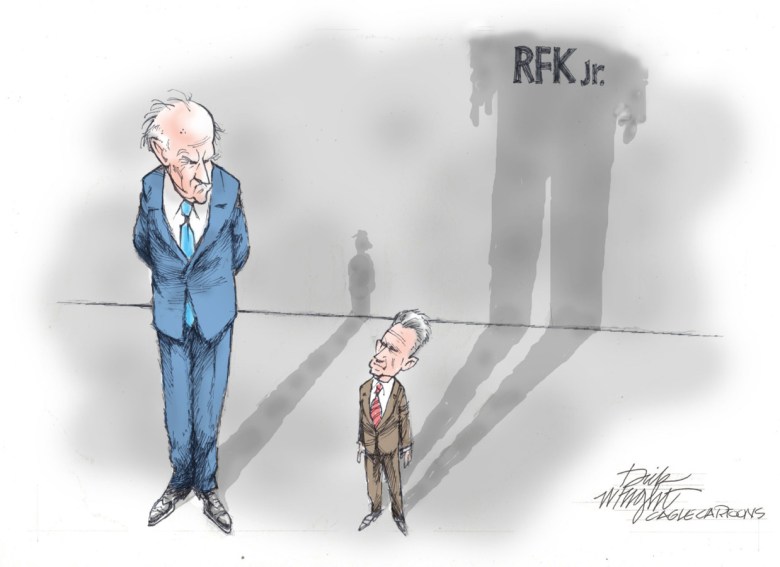OP-ED | How a Conspiracy Theorist Could Become President


Look out, world – here comes Robert F. Kennedy Jr.! Gaining the support of just 15% of all Democrats might not sound like much for the man who began his Democratic presidential campaign two months ago. But that 15% figure from a recent Harvard CAPS-Harris Poll could increase substantially, considering how RFK’s current favorability rating of 49% beats Joe Biden and Donald Trump, both at 44%, according to an Economist/YouGov survey.
Clearly, RFK is gaining momentum, enabled by his presence on a number of podcasts – enabled being the operative word. Joe Rogan, for example, is so enamored with the nephew of our 35th president that he sought a high-profile debate for him on his own highly-rated podcast.
“Joe Rogan challenged vaccine researcher Dr. Peter Hotez to debate presidential candidate and anti-vaxxer Robert F. Kennedy Jr. after he criticized the Democratic presidential candidate for doubling down on his controversial stance on ‘The Joe Rogan Experience’,” reported the New York Post. “Rogan pledged to donate $100,000 to a charity of Hotez’s choosing if he agreed to appear with the political scion.”
Hotez, the dean of the National School of Tropical Medicine at Baylor College of Medicine, declined the invitation, saying, “I’ve offered to come and talk to Joe Rogan again, and have that discussion with him, but not to turn it into the Jerry Springer show with having RFK Jr. on.”
Hotez’s refusal to debate Kennedy on Rogan’s podcast was not a popular decision among numerous citizens and mega-rich celebrities.
“A vaccine scientist says anti-vaccine activists ‘stalked’ him at his home Sunday after Joe Rogan and others, including Twitter owner Elon Musk, challenged [Hotez] to debate Robert F. Kennedy Jr., an anti-vaccine proponent and Democratic presidential candidate, over vaccine misinformation,” reported The Washington Post.
“Then, billionaires claimed they’d give more money and vaccine skeptics piled on,” added the Post. “Among them was Musk, who tweeted that Hotez was ‘afraid of a public debate, because he knows he’s wrong’.”
Indeed, what’s the problem with a lively debate on a popular podcast? As one of my Twitter followers suggested, isn’t Rogan simply “offering up a platform for a debate between a Democratic presidential candidate and a doctor?”
Well, no. Not really. “Debating” a thoroughly debunked conspiracy theorist on a podcast in hopes of enlightening the public has precisely the opposite effect: It further obscures the truth by providing a public forum to a rich candidate with name recognition and a long history of spreading misinformation. In short, “Joe Rogan’s penchant for inviting people with diametrically opposed versions of COVID-19 is a prime example of bothsidesism: ‘A tendency to treat all policy debates as if the opposing sides present equally strong arguments, or are equally valid or equally dangerous.’”
I wrote those words in February of 2022 during Rogan’s original Covid-19 controversy involving a number of podcast guests spouting pandemic falsehoods. Rogan later offered a pseudo-apology, promising to “balance things out.” But as we’re seeing right now, his idea of “balance” is a bit skewed.
“Still,” many argue, “if RFK is so wrong, a one-on-one debate with a medical expert will only expose his quackery.”
Maybe at one time, but not anymore. Long gone are the days of Lincoln and Douglas or Kennedy and Nixon contrasting their policies in verbose exchanges. Today, debates are essentially the equivalent of televised circuses. What’s more, explains Washington Post columnist Philip Bump, “many people will see only snippets of the debate on social media – often the ones that their political coalition found most useful.”
In other words, thanks to populist platforms like podcasts and social media, misinformation spreads disproportionately, erasing any so-called “balance” Rogan might provide. If you’re already a fan of Robert Kennedy Jr., you’ll hang on his every word and retweet the portions of the “debate” that confirm your bias. For that matter, you’ll do the same thing if you’re a fan of Dr. Peter Hortez and the ideas he espouses such as, um, science.
Adds the Washington Post’s Bump, “Perhaps the most important factor…is the internet’s reinforcement of the idea that people can become experts on anything by ‘doing their own research.’ Often this simply means substituting the views of an actual expert for the views of someone who is questioning the expert, rewarding the perhaps innate sense in people (and particularly young men) that they know better than the people who are telling them what to do.”
In the end, the brave new world of the internet, social media, podcasts, algorithms, and confirmation bias has basically rendered rational debate and reasoned discussion passé. And that paves the way for a bonafide conspiracy theorist like Robert Kennedy Jr. to take a serious run at the presidency. If a serial liar can become president, after all, then why not RFK Jr.?
This article has been archived for your research. The original version from CT News Junkie can be found here.


